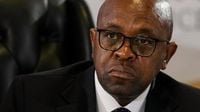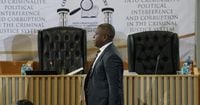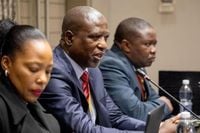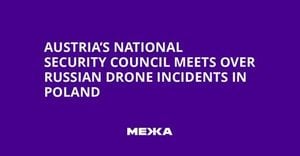South Africa’s criminal justice system is once again under the spotlight, but this time, the allegations are coming from within its own ranks. On September 17, 2025, KwaZulu-Natal Police Commissioner Nhlanhla Mkhwanazi took the stand at a government-backed commission of inquiry to testify on his explosive claims that criminal syndicates have infiltrated both the police force and the justice system. The testimony, which came just months after a bombshell news conference in July, has sent shock waves through a country already grappling with one of the highest crime rates in the world.
At that July news conference, Mkhwanazi didn’t mince words. He alleged that some of South Africa’s most senior politicians and police officials were actively interfering in sensitive investigations—not for the sake of justice, but to protect drug cartels and criminal organizations. According to Associated Press, Mkhwanazi stated, “It has been my aim that I want to demonstrate that the criminal justice system has been subject to a continuous threat, as well as sabotage, which has been with us over an extended period. To a point where we believe it is at real risk of total collapse if nothing is done.”
The public response was immediate and intense. President Cyril Ramaphosa, under mounting pressure, appointed a commission of inquiry to investigate these allegations. Parliament, not content to leave the matter solely in the hands of the executive, launched its own separate investigation. The stakes are high, not just for the accused individuals but for the credibility of South Africa’s entire system of law enforcement and justice.
Mkhwanazi’s claims were specific and damning. He accused Police Minister Senzo Mchunu and Deputy National Police Commissioner Shadrack Sibiya of being among those who interfered in critical investigations. According to Devdiscourse, Mkhwanazi alleged that both men played a role in disbanding a special crime unit that had been investigating politically motivated killings in KwaZulu-Natal after it became clear that criminal syndicates were involved. The same unit, he said, had managed to crack two high-profile unsolved murder cases involving musicians, exposing the crime cartels allegedly behind their deaths. Both Mchunu and Sibiya have since been suspended and are expected to testify before the commission in the coming weeks.
The public’s skepticism, however, runs deep. South Africa has a long history of police corruption, and while allegations are not new, it is exceptionally rare for such accusations to come from a sitting high-ranking police official. As Reuters notes, the unusual nature of Mkhwanazi’s stance has only added fuel to the fire of public debate. Many South Africans are asking: Will this commission be different, or will it go the way of so many previous inquiries—lots of talk, little action?
Julius Malema, leader of the Economic Freedom Fighters (EFF) party, has voiced his doubts about the commission’s effectiveness. He has called for Mkhwanazi to be the first witness before a parliamentary committee, arguing that a parliamentary investigation would carry more weight than a commission of inquiry. “The focus must be on outcomes, but most significantly, implementation of its findings. Too often this is the weakness in the commission of inquiry approach,” Malema said, echoing the concerns of many South Africans who have seen similar commissions come and go without meaningful change.
Adding to the political drama, the official opposition party, Umkhonto we Sizwe (MK Party), announced it would challenge the legality of the commission in court on September 18, 2025. The party has accused President Ramaphosa of failing to act on the recommendations of past commissions, suggesting that the current inquiry might be little more than a public relations exercise.
Experts in law enforcement oversight are watching the proceedings closely. Louise Edwards, a crime expert from the African Policing Civilian Oversight Forum, told Associated Press that the current probe has the potential to transform South African law enforcement—if, and only if, its recommendations are implemented. “We have to remain optimistic, but the only way I see real change happening is if the findings and recommendations of the commission lead to real consequences, systemic reforms, and sustained oversight, particularly by permanent oversight structures,” she said. Edwards also highlighted the impact these issues are having on police morale: “The issues raised by Mkhwanazi are hurting effective policing and eroding morale among officers who are expected to fight crime.”
It’s not hard to see why morale might be low. South Africa’s police officers are on the front lines of a country with staggering crime statistics. According to BBC, South Africa consistently ranks among the world’s most crime-ridden nations, with citizens often expressing little faith in the ability—or the willingness—of the police to protect them. Allegations of corruption, bribery, and collusion with criminals have dogged the force for decades. But when a sitting provincial commissioner publicly accuses colleagues and politicians of direct involvement with criminal syndicates, it marks a new and unsettling chapter in the country’s ongoing battle with crime and corruption.
The commission of inquiry, established by President Ramaphosa, is now tasked with sorting fact from fiction, rumor from reality. Both Mchunu and Sibiya, the officials named by Mkhwanazi, remain suspended pending their testimony. The commission’s proceedings are being closely followed by both the public and the media, with many wondering if this time, the truth will finally come out—and if those responsible will be held to account.
Meanwhile, parliament’s separate investigation continues, and the legal challenge from the MK Party looms. The debate over which institution is best suited to handle such explosive allegations reflects a broader crisis of confidence in South Africa’s political and judicial leadership. Many citizens are left to wonder whether any of these processes will result in lasting change, or if the cycle of scandal and inaction will simply repeat itself.
For now, one thing is clear: the eyes of the nation are on the commission, on parliament, and on the courts. Whether these institutions can rise to the challenge and restore faith in South Africa’s criminal justice system remains to be seen. The stakes, as Commissioner Mkhwanazi warned, could not be higher.






